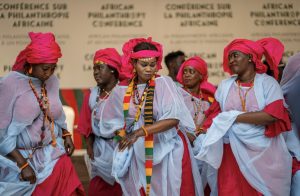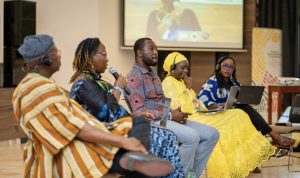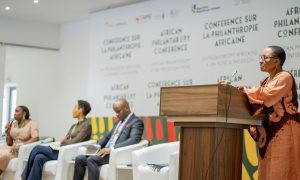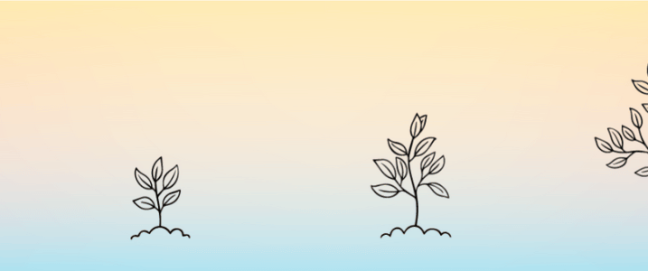This year’s 4th Annual African Philanthropy Conference in Saly, Senegal in August 2023, was hosted by TrustAfrica, African Philanthropy Forum (APF), Centre on African Philanthropy and Social Investments (CAPSI), African Philanthropy Network (APN), East African Philanthropy Network (EAPN), and Southern Africa Trust. The theme was “African Philanthropy at an Inflection Point”.
“Let’s start what we have come into the room to do!” – Fela (from his song Let’s Start)
I stepped into the conference wondering if we would truly allow ourselves to dream, to break free from siloed work, to be introspective and admit where we, as African development practitioners, have played a role in the situation we find ourselves. Are we up for this challenge? After four years of gathering annually, is there a way forward? The answer is…below!
The conference oscillated from a mood of celebration/remembering past achievements to one of deep reflection where we were not afraid to ask ourselves the hard and difficult questions of what it would take to make change happen.
During the first plenary session on Transformative Philanthropy Practices under the ‘Practices’ dimension of the conference subtheme, I appreciated the hard-hitting remarks by Hakima Abbas of the Black Feminist Fund who expressed frustration with African philanthropy for “tinkering around the edges”. She asked, “Shouldn’t we be brave enough to allow ourselves to be led by the repressed marginalized groups we claim to be working for?” In the ways that we work, we are found wanting because we don’t practice what we preach. She concluded her remarks by saying “We do not give grants that can really be transformative, yet we demand that the little we give must do magic.”
Other speakers during that first panel also questioned some of the practices we have now normalized in our work.
“We tend to collaborate very well when there are emergencies, but we don’t sustain it during normal times” observed Mosun Layode of APF.
Following Mosun’s statement, Evans Okinyi of EAPN added that we need to move beyond the talks to demonstrate that collaboration can work. He added, “We often talk about risks in isolation, but this has to stop.” If we are serious about the way we work, then African philanthropy must resonate, vibrate, and inspire on the global stage.
For Stigmata Tenga with APN, she asked for bravery and petitioned African philanthropic institutions not to continue working to appease donors and governments who do not put communities at the centre of the work.
And then there was the keynote speech by Mamadou Biteye of the African Capacity Building Foundation. I got the chance to grab coffee with him towards the end of the first day and asked him some further questions about his keynote, but he began his speech by laying out the state of play of African philanthropic institutions. “When we don’t have strong systems and shared values, how do we expect to cope?”
And in terms of practices that we need to shift away from, he added: “We often don’t feel the pressure to account for what we do to society…we only account to our donors.”
This first day set a tone for the rest of the conference and gave permission to break the rules that were set by others.
To go forward, we must first remember.
But first, a step back in remembering the road travelled to get us to this inflection point. The following points all come under the “People and Power” dimensions of the conference subtheme, taken from Day 1 and 2.
Bhekinkosi Moyo of the Centre on African Philanthropy and Social Investment reminded the audience that the fear we had four years ago during the first conference in 2019 was different. In attempting to position African philanthropy on the global stage, the question we asked ourselves then was if there was enough data and insight to discuss African philanthropy.
We were coming from a place of perceived “lack” and we set ourselves on a mission that would allow us to come from a place of “abundance.” Since then, not only has Africa navigated the COVID-19 pandemic and a host of other global and continental challenges, but African philanthropic institutions have also armed themselves with data and insights. The fear of today is one of momentum – can we sustain what we are building? What does African philanthropy at an inflection point mean to our work, our practices, our ways as Africans?
At the core of African solidarity lies the age-old concept of ubuntu, a word that encapsulates the idea of a shared humanity. And this word was anchored in my heart as I listened to Akwasi Aidoo’s (Humanity United) keynote speech on the second day. Power, he said, is not given away peacefully.
A little history lesson: When France asked its colonies in 1958 if they desired full independence and Guinea responded with a resounding “Yes!”, they were punished for it. Kwame Nkrumah of Ghana gave $10 million to Guinea to support Sekou Toure’s government after independence from France because France took away everything, from pens to chairs to desks to rail lines. This was the first philanthropic attempt to really bring Africa together, even before the concept of the African Union. The tripartite Pan-African alliance of Ghana, Guinea, and Mali was the first dream of a united Africa. The Ghana-Guinea-Mali song by E.T. Mensah is a celebration of this effort. Akwasi ended his keynote with a quote from Florynce Kennedy urging us to continue the good fight, “Freedom is like taking a bath: You got to keep doing it every day.”
Is there a way forward?
The short answer is, yes there is, and it is centred on people-led philanthropy. But could there be a problem with how we go about people-led philanthropy?
To begin with, for Briggs Bomba with TrustAfrica, “Whatever the question is, the answer is community!” And this means connection, power, relationships, moving forward together.
In the plenary session Strengthening Agency and Building People Power, Marema Toure with the Association of African Women for Research and Development – Senegal and CODESRIA, pointed out that in Africa we know what donations and generosity means because it is always about those closest to us, people we know. “However, what we can learn from philanthropy is the action of closing our eyes and supporting and investing in those that are not close to us.” For her, supporting those we do not know is how change happens.
For Rachael Mwikali with Pussy Power, “we often don’t have the luxury of picking the rights we have or want to have, and change can only happen when we have the resources that allow us to keep our dignity.” Pedigrees and privileges often get in the way of finding a solution to our challenges, she argues.
When it comes to African liberation (and philanthropy), McDonald Lewanika of Accountability Lab Zimbabwe, stated that at the crux of the problem is representation, redistribution (of power, resources), and participation (the different ways of knowing). He wondered out loud if we have a shared understanding of what people power is? “If people power is inherent, why does it need to be strengthened or built?” For him, perhaps a way forward is for us to stop picking who the “people” are and deciding for them.
Gerry Salole’s keynote speech highlighted some of the things he’s noticed and been frustrated with lately. First, he pointed out the use of “jargonness” in our work. “We use jargon to cover up the fact that we are not able to live up to the promise.” Second, the use of the word “agency” is a problem. “It implies that it is something we can give to people. Agency is an asset that cannot be delivered to someone.” And when people come together to use their power, this is something that governments and even donors are afraid of. However, it is no longer fashionable for governments and donors to insist on doing things their way, things now must be negotiated. “But this negotiation is problematic because it also takes away agency, spontaneity.”
Breakout sessions
Keeping to the somewhat tight schedule was a bit of challenge during the conference which made for some very long days, but I managed to make it some breakout sessions that piqued my interest.
The session on Creating an Enabling Environment moderated by Atieno Odhiambo with Urgent Action Fund – Africa brought up issues of relational power, transparency and accountability, and proposed adopting the capitalist approach for building trust.
Nyeleti Honwana with the Harry Frank Guggenheim Foundation, a private foundation that funds research on conflict around the world and which runs several scholarship award programs, noted that power, privilege, and access still determine who gets funding. And knowing this has prompted her in her work to have a more holistic approach to the African scholars the foundation supports, seeing them as experts in their field and telling fuller narratives about their work.
For Atieno Odhiambo, the inflection point for African philanthropy is about increasing the importance of transparency to institutions. But don’t go into communities talking about transparency and accountability, because “those are big words and are meaningless to the communities we serve.”
The session on Governance and Leadership, moderated by Jackie Asiimwe with CivSource Africa, looked at the role of governance and leadership in shaping the philanthropic sector, including the potential for more effective governance structures and leadership practices to support the growth and impact of philanthropic organisations.
The session started by asking “What happens when things go wrong in our institutions because of bad leadership? How do we hold ourselves accountable?” I was hoping that the panel would reflect on past scandals our sector has had to deal with and challenge us practitioners to hold the tension between “trust and truth”.
We came close to unpacking this challenge with the comments from Aisha Dabo (Africtivist Network) who suggested that it might be time to move leadership beyond title. Echoing Gerry Salole’s comments earlier about agency, Aisha questioned if agency is something that is given or ignited. And maybe a way around the leadership crisis we face is to model other alternative practices of flatter and more horizontal organizations.
Take-aways
The conference ended with the closing address of Coumba Toure, Chair of the TrustAfrica Board. She wasn’t there during the first day of the conference when Hakima Abbas of the Black Feminist Fund challenged us in her remarks to be led by the repressed communities we serve, and so when Coumba asked, “Why don’t we trust poor people with money?”, it brought the whole conference full circle for me.
The word “collaboration” was mentioned in almost every plenary and breakout session during the conference, and it was the underlying theme, in my opinion of the conference, despite the four subthemes of people, power, policy, and practice. Both Mamadou and Mosun lamented the lack of collaboration between philanthropic organizations, and if we are to move forward then this challenge must be addressed.
The answer to African philanthropy taking centre place on the global stage is community, people-led development. This, everyone in the room, agreed upon. The introspection that took place during the conference was welcoming and I believe that it would spur further action going forward. “We must stop and think about the future and decide which direction we must take,” says Ebrima Sall, TrustAfrica.









Comments (0)